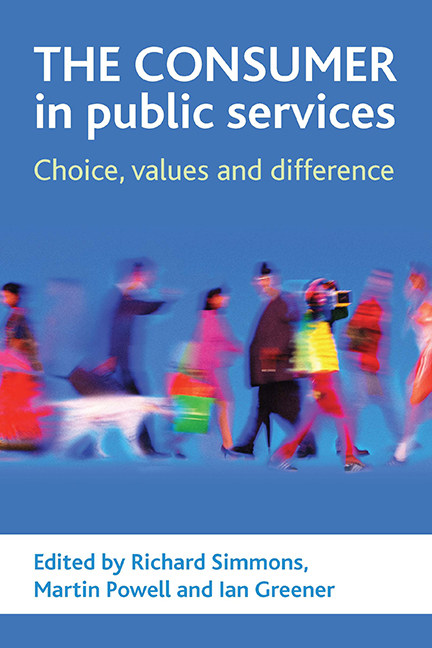Book contents
- Frontmatter
- Contents
- List of figures and tables
- Acknowledgements
- Notes on contributors
- Foreword
- one Introduction: managing the ‘unmanageable consumer’
- two The consumer and New Labour: the consumer as king?
- three Narratives of public service delivery in the UK: comparing central and local government
- four Understanding the ‘differentiated consumer’ in public services
- five Differentiating consumers in professional services: information, empowerment and the emergence of the fragmented consumer
- six The healthcare consumer
- seven The consumer in education
- eight The consumer and social housing
- nine The people’s police? Citizens, consumers and communities
- ten The consumer in social care
- eleven Differentiated consumers? A differentiated view from a service user perspective
- twelve Authoritative consumers or experts by experience? User groups in health and social care
- thirteen The public service consumer as member
- fourteen Conclusion: the consumer in public services
- Index
three - Narratives of public service delivery in the UK: comparing central and local government
Published online by Cambridge University Press: 22 January 2022
- Frontmatter
- Contents
- List of figures and tables
- Acknowledgements
- Notes on contributors
- Foreword
- one Introduction: managing the ‘unmanageable consumer’
- two The consumer and New Labour: the consumer as king?
- three Narratives of public service delivery in the UK: comparing central and local government
- four Understanding the ‘differentiated consumer’ in public services
- five Differentiating consumers in professional services: information, empowerment and the emergence of the fragmented consumer
- six The healthcare consumer
- seven The consumer in education
- eight The consumer and social housing
- nine The people’s police? Citizens, consumers and communities
- ten The consumer in social care
- eleven Differentiated consumers? A differentiated view from a service user perspective
- twelve Authoritative consumers or experts by experience? User groups in health and social care
- thirteen The public service consumer as member
- fourteen Conclusion: the consumer in public services
- Index
Summary
To disaggregate the ‘differentiated consumer’ of public services, it is important to consider how policy actors in central and local government talk about those who use key services: health, education, welfare, transport and policing. This chapter gives an interpretative account of public services in the UK, exploring how different words and narratives are used in government texts and the extent to which these vary between services and levels of government. Through measuring the frequency with which certain keywords appear it is possible to assess the emphasis that policy makers place on certain identities – such as citizen, taxpayer and customer – and to trace the importance of certain narratives – such as standardisation and differentiation.
Although a binary distinction between central and local government obscures the messiness of the networks that broker policy outcomes, it usefully focuses on two authoritative centres of state power (Marsh and Rhodes, 1992, p 264). The relationship between central and local government in the UK has been adversarial for several decades, as the centre has stripped powers away and enforced tighter control – often in the name of greater decentralisation. A range of new institutional forms has been created or expanded – quangos, foundation hospitals, academy schools, housing associations, business improvement districts – in which local authorities are sidelined (Jones, 2008). At the same time an elaborate apparatus of quality assurance and performance management has closely controlled resource allocation, management practice and policy priorities at the local level. Interest in ‘localism’ and decentred policy solutions, from across the political spectrum, more recently may be suggestive of a counter-trend, a willingness to delink centre/local narratives and priorities (Letwin, 2005; Brown, 2006; Campbell, 2006; Miliband, 2006). Given the ambivalence of national politicians about local government, it is interesting to trace how far integrated narratives are deployed at central and local levels.
In exploring the ways in which central and local government texts talk about service users, the chapter takes an interpretative approach that follows the work of Hay (1999, 2003), Bevir and Rhodes (2003, 2004) and Bevir (2005). In their discussion of British governance, Bevir and Rhodes explain, ‘Interpretive approaches begin from the insight that to understand actions, practices and institutions, we need to grasp the relevant meanings, the beliefs and preferences of the people involved’ (Bevir and Rhodes, 2003, p 1).
- Type
- Chapter
- Information
- The Consumer in Public ServicesChoice, Values and Difference, pp. 39 - 56Publisher: Bristol University PressPrint publication year: 2009

